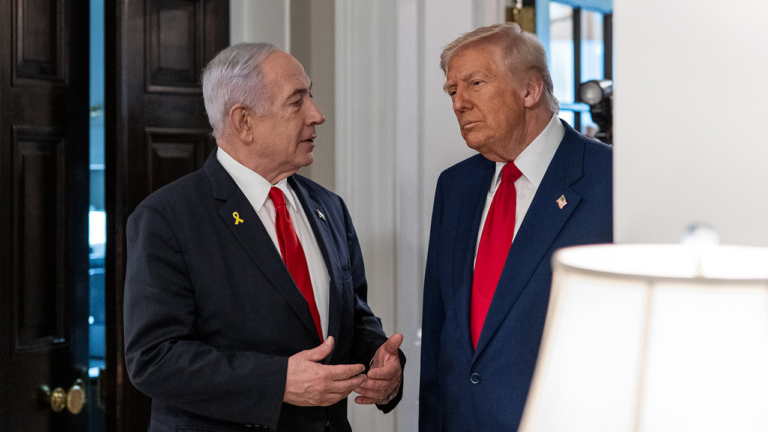
We may never, or at least not anytime soon, know definitively how much of Iran’s nuclear program Israel and the United States destroyed. But even if the attacks of June 13-25 did significant damage to Iran’s nuclear facilities and its suspected weaponization program, the White House may be counting on American military prowess to substitute for a coherent geostrategic vision. Indeed, when asked at a June 27 press conference about the prospect of future US strikes on Iran if the US president deems it necessary, President Donald Trump replied, “Sure, without question, absolutely.”
Or, perhaps Trump will agree to let Israel do the job of “mowing the grass,” i.e., periodically attacking Iran to prevent it from rebuilding its nuclear program. Indeed, President Trump and Israel’s Prime Minister Benjamin Netanyahu may even envision an Iran link to the Gaza ceasefire deal that is currently under negotiation and that Netanyahu is expected to discuss with Trump during his July 7-10, 2025, visit to Washington. Along these lines, Israel could agree to a conditional acceptance of a 60-day Gaza truce—something that Trump is said to eagerly want—in return for an implicit or explicit commitment from Trump to provide US support (diplomatic and military) for an Israeli policy of continuing to attack Iran “as needed.”
But even if Netanyahu agrees to the Gaza ceasefire deal, or pretends to do so, he may believe that Trump’s reliance on improvisation and tactics over any clear strategy will play to Israel’s favor. Trump’s desire to show that he is a successful peacemaker could incline him to cut a deal that Netanyahu probably seeks, but that would be very unwise for the United States. If Trump wants to avoid the nightmare of endless military entanglement with Iran, he must tell Netanyahu that while he expects him to accept the Gaza ceasefire—however tenuous—he will not tie that acceptance to the United States allowing an Israeli strategy toward Iran that could invite some form of an “endless war.” It is hoped that Netanyahu hears this message clearly from Trump. If he does not, the Israeli leader might rightly conclude that the US president is once again his greatest enabler.
Back to the Future on Iran Enrichment
Given the pounding that Iran recently took from Israel and the United States, one might assume that its leaders would now be prepared for diplomacy, even if their anger and humiliation incline them toward defiance. And yet it is entirely understandable why Tehran still rejects the White House’s continued demand that “zero enrichment” is the only basis for a nuclear deal. For Tehran, this demand constitutes an ultimatum rather than a serious basis for a negotiated compromise. From Iran’s vantage point, the White House’s current position is hardly an improvement on Trump’s June 17 demand for the Islamic Republic’s “unconditional surrender.”
Trump likely made that demand believing that the Israeli and US bombing campaign would force Iran to capitulate. Thus, beyond his brief flirtation with the idea of regime change in Tehran, Trump may have assumed that the 14 “bunker busting” bombs that the United States would soon drop on Iran’s enrichment centers in Fordow and Natanz would eliminate its nuclear program—and with it any need for negotiations. However, this did not happen. To be very clear—and as the Pentagon has stated—the US and Israeli attacks set back Iran’s nuclear program by up to two years. But because Iran’s nuclear program was not destroyed—a very unlikely scenario from the start—it now faces serious challenges but also has some opportunities. The challenge comes from the damage done to Iran’s ballistic missile system and even more so to its nuclear weapons-making capacity. As for the opportunity, it comes from Iran’s successful effort to shield or hide its 900 pounds of 60-percent enriched uranium. What this means is that Iran retains some leverage in any negotiation, assuming that it—and the United States—agree that Tehran can trade away some or most of its enriched uranium in return for a deal that ends nuclear-related sanctions while allowing it to sustain limited, if closely monitored, enrichment.
Iran’s recent decision to suspend cooperation with the International Atomic Energy Agency (IAEA) is likely to preclude any deal. But the move is not surprising considering the White House’s continued insistence on zero enrichment. From Iran’s perspective, it has nothing to lose by breaking its already tense relationship with the IAEA. Yet what the Islamic Republic’s leaders do not seem to grasp is their own role in bringing the situation to this dangerous point. They have long resisted cooperating with the IAEA to such a degree that on June 11, 2025, the UN watchdog released a report condemning Iran for refusing to fulfill its obligations to allow the agency full access to its suspected weaponization sites. Iran tried to justify its suspension of the IAEA access by claiming that the UN agency had sided with western powers and provided a justification for Israel’s June attack. But this was unlikely. On the contrary, from the start of Israel’s assault, IAEA Director Rafael Grossi warned that “I have repeatedly stated that nuclear facilities must never be attacked,” thus underlining his total opposition to Israel’s actions.
And yet despite Grossi’s clear objection to any Israeli attack, Israel, the IAEA, and the United States all had compelling concerns about the Iranian nuclear program, especially its weaponization dimensions. Rather than address these concerns, Iran’s leaders fed them with their usual blend of obstinacy and overconfidence. Fond of lecturing what he calls the “arrogant powers” (especially the United States), Iran’s Supreme Leader Ali Khamenei and his hardline allies are not immune to displaying an exaggerated national pride that has done Iran more harm than good. Thus they have left Iran in a militarily vulnerable state, hoping or praying that however menacing, the current situation will not lead to further conflict. This situation has created a dangerous vacuum that could push Iran’s leaders to the potentially perilous conclusion that the only path left to ensuring regime survival is to build a full-fledged nuclear weapons program without the constraints of IAEA monitoring.
“Mowing the Grass” Versus Diplomacy
In the final analysis, the foreign policies of Netanyahu, Khamenei, and Trump are all driven by the logic of regime survival. But the difference may be that the leaders of Iran and the United States both have a domestic interest in preventing Israel from coaxing the White House into becoming a partner in, or even tacitly allowing, a strategy of periodically attacking Iran in a manner that would echo the “mow the grass” policy. Israel has used this tactic in Gaza prior to this current war, and perhaps wants to use after it. From Trump’s part, he does not want to get the United States itself dragged into Israel’s new forever war, since some of his core supporters, and the wider American public, clearly oppose such a US entanglement. Indeed, these very domestic concerns were surely paramount in Trump’s mind when he chided both Israel and Iran for violating the “complete and total ceasefire” that he had announced on June 24—using an expletive to make his point and his anger crystal clear. With his budget bill now passed and the midterm elections on the not-so-distant horizon, Trump needs peace in the Middle East, not war.
Trump Must Reject Linkage
The irony is that Trump has been Netanyahu’s greatest enabler. Now, however, the US president can no longer afford to make seemingly off-the-cuff remarks that may signal to Israel that it can pursue whatever policies it chooses. In the case of Gaza, Israel’s policy, supported by the United States, has been the near obliteration of the Strip and the killing of tens of thousands of innocent civilians.
If Trump is serious about peacemaking, which he insists he is, he should tell the Israeli prime minister this week that he will be very unhappy if Israel resists or violates the Gaza ceasefire or tries to pull the United States into a strategy that could prompt the wider regional war that Trump says he opposes. Whatever positive spin Trump and Netanyahu try to put on the Israeli prime minister’s visit to Washington this week, it is likely that the two leaders may have real differences when it comes to Israel’s room for maneuver as the smoke clears from the US and Israeli military campaign in Iran. The question is whether these differences will make a real difference for Trump’s approach.
The views expressed in this publication are the author’s own and do not necessarily reflect the position of Arab Center Washington DC, its staff, or its Board of Directors.
Featured image credit: Flickr/The White House

